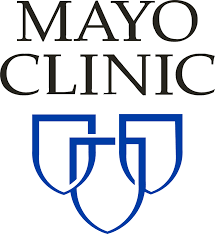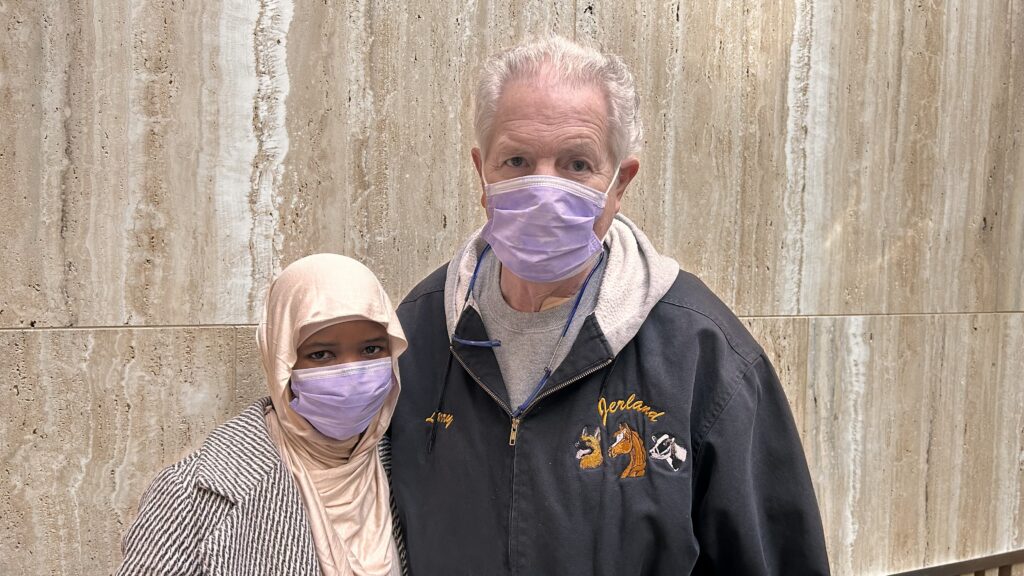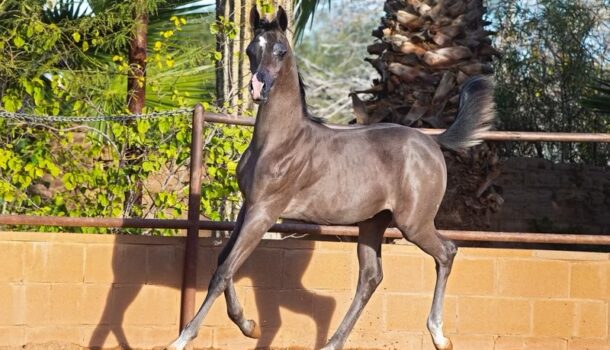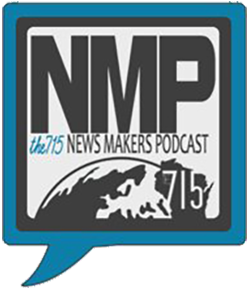ABOVE PHOTO:This Arabian filly was named Asiya in honor of Patient Care Assistant Asiya Awad.
When a colleague told Asiya Awad that a patient had asked her to stop by his room, she expected it was just to visit.
“I’m naming her after you,”
Despite their differences in age and culture, Awad and the patient, Larry Jerome, had developed a close friendship and often chatted about their lives and families.

“I call him Mr. Fantastic,” says Awad, who is a patient care assistant (PCA) at Mayo Clinic in Rochester, Minnesota. “He’s really special to me.”
When Awad got to the room, Jerome — who breeds prize-winning Arabian horses and other animals at Jerland Farms in Barron, Wisconsin — showed Awad a video of an Arabian filly that had been born the night before.
“Oh, she’s so cute!” Awad said.
Jerome smiled. He knew the filly was more than cute. She was exceptional. And he’d chosen to give her a special name to match her potential.
“I’m naming her after you,” he told Awad.

The news made Awad emotional. But she tried not to let it show.
After hugging Jerome, she went to the bathroom and cried.
“In my head, I was just doing my job,” Awad says. “I was not thinking of me. I was thinking of him and how the patient comes first. The patient deserves everything. But he thought I deserved something, too.”
A long journey to Rochester
Awad’s journey to Mayo Clinic began when her family fled their home in Somalia and moved to a refugee camp in Ethiopia.
“Because of the civil war, Somalia was not safe,” she says. “We’d hear shots and bombs in the middle of the day. My mom said anywhere is better than hearing shots fired every day.”
In Ethiopia, the family lived in a structure made of cardboard, tree branches and clothing.
“I just bought a TV, and the box it came in reminded me of my home in the refugee camp,” Awad says.
Once a month, an aid organization would distribute food: grain, beans and oil. Water came from a well, and milk from goats.
“When we got to the U.S., we wondered why there were nine different kinds of milk,” Awad says. “There were so many choices. Why so many milks?”
After 10 years in the camp, the Awads learned they would be able to immigrate to the U.S.
“My brother has muscular dystrophy, and that’s why we were able to come to the U.S.,” Awad says. The family — Awad, her parents and six siblings — arrived in San Diego in 2014.
Two hours after their plane landed, Awad was rushed to the hospital by ambulance and diagnosed with tuberculosis. She spent her first two weeks in the U.S. in isolation in a hospital.
“The doctors, nurses and PCAs were all so nice,” she says. “They all wanted to help me.”
She’d remember their kindness when choosing her own career path.
From California to Minnesota
In San Diego, Awad began working as a housekeeper and taking English lessons. After two years, the family moved to Rochester so her brother could receive care at Mayo Clinic.
Awad resumed English classes at Hawthorne Education Center, where she also learned about career opportunities. Two options stood out: becoming a paraprofessional educator or a certified nursing assistant.
“When I was younger, I wanted to be a teacher,” she says. “But when I thought about everything people had done for me in the hospital, I decided, ‘I want to do that for someone.'”
After earning a certified nursing assistant certificate from Hawthorne Education Center, Awad began working at a nursing home. She loved the work, but, after three years, was ready for a new challenge. She returned to school, earned an advanced certificate, and became a patient care assistant at Mayo Clinic in March 2021.
I want the patients to feel happy. I don’t want them to feel like a patient. I want them to feel human and to feel they are home when they are in their room.
“I help patients with daily life activities,” Awad says. “I take their vital signs, help them in the bathroom and help with feeding if needed.”
But she does much more than that.
“I want the patients to feel happy,” Awad says. “I don’t want them to feel like a patient. I want them to feel human and to feel they are home when they are in their room. And I want them to know that they’re not alone, that I am here for them.”
She now asks patients the question that her care team in San Diego asked her: “What can I do for you?”
Honoring a new friend
For Jerome, the answer to that question was often to share a conversation.
“I’ve traveled and worked internationally, and I’m very interested in other cultures,” Jerome says. “I like to learn. I asked lots of questions about Asiya and her family, and she asked me about mine.”
The two also shared a sense of humor.
“I joked around with her, and she gave it right back,” Jerome says. “She is a charming, charming individual. She impressed me. She made me happy.”
When it came time to name that new filly, Jerome wanted to choose a name connected to his stay in Rochester.
“I try to make the names of my animals meaningful,” he says. “I have a line of horses all named after Nat King Cole songs and a line of blues — Blue Moon, Blue Jay, Forever in Blue Jeans.”
He didn’t have to think long about the right name for the “extremely exceptional filly” he believes may one day grace the cover of a magazine.
“I wanted to honor Asiya,” Jerome says. “She is a phenomenal person and pretty special to me. Now, when people ask me about the horse’s name, I’ll be able to tell them Asiya’s story.”
“It’s mind-blowing that Larry did that for me,” Awad says. “I’m very grateful and happy that he thought of me.”
Awad is also grateful to be at Mayo Clinic.
“I could not do my job and do my best work without the support of my colleagues,” she says. “I am grateful to them every day.”
Awad is once again ready for a challenge. She’s begun working toward her nursing degree, which will give her new opportunities to care for patients.
And while she still believes she would have enjoyed teaching, her name suggests she’s living her destiny.
The meaning of Asiya? “One who tends to the weak and comforts them.”


